The Principles and Practice of Engineering exam is crucial for engineering licensure, requiring specialized preparation through structured tutoring, comprehensive study methods, and expert guidance to achieve the 60-75% first-time pass rates across disciplines.
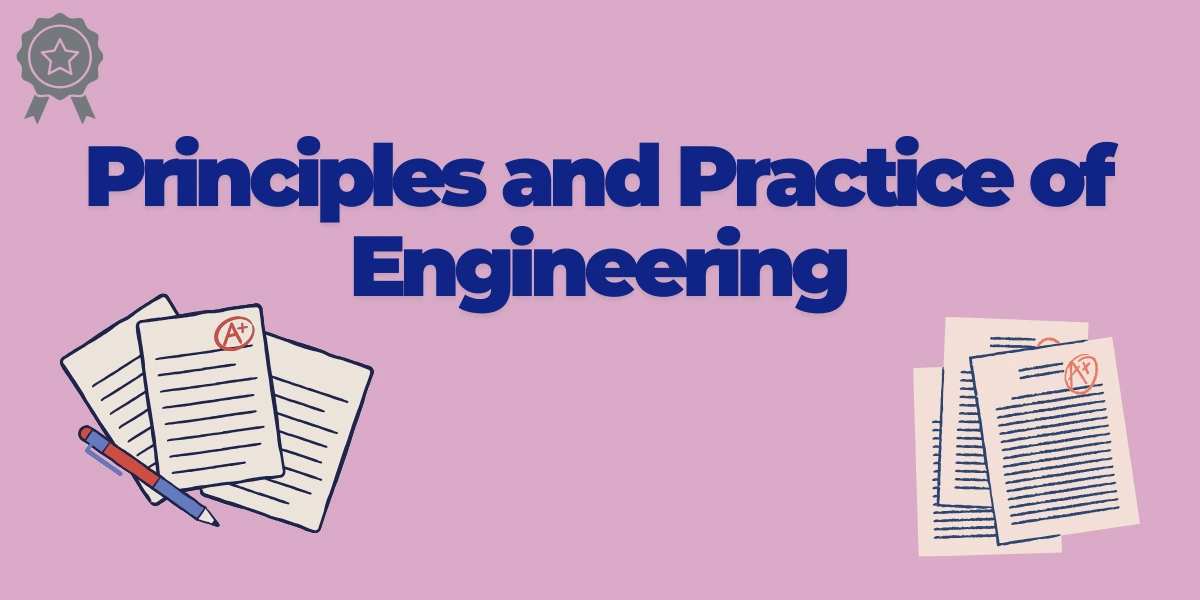
Understanding the Principles and Practice of Engineering Exam
The Principles and Practice of Engineering exam represents the final and most challenging hurdle in an engineer’s journey toward professional licensure. This comprehensive examination, administered by the National Council of Examiners for Engineering and Surveying (NCEES), serves as the gateway to becoming a Professional Engineer (PE) in the United States.
Navigating the requirements can be confusing for new graduates. To clarify the path ahead, here is the standard four-step roadmap required by most state boards to achieve full licensure.
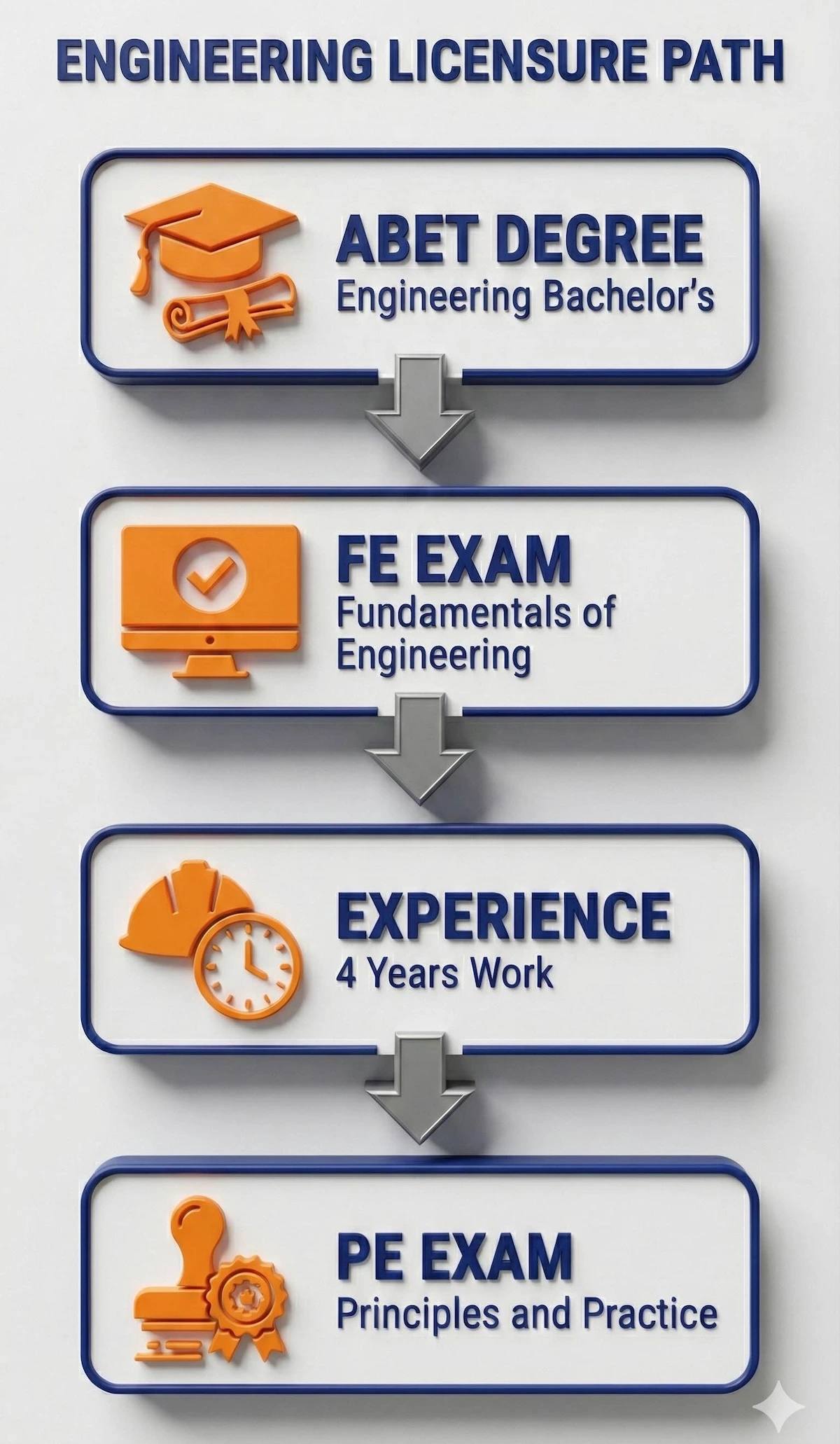
The four critical milestones on the path to becoming a licensed Professional Engineer.
Completing these four steps sequentially ensures you meet the NCEES requirements without unnecessary delays.
For engineering students and recent graduates, understanding the PE exam’s significance extends far beyond academic achievement. It’s the cornerstone credential that separates professional engineers from their unlicensed counterparts, opening doors to leadership roles, higher salaries, and the legal authority to sign and seal engineering documents.
The examination tests minimum qualifications in specific engineering disciplines and is designed for engineers who have gained at least four years of post-college work experience in their chosen field. With 27 different disciplines offered, from civil engineering to nuclear engineering, each exam presents unique challenges that demand specialized preparation.
The Critical Role of Professional Engineering Licensure
Professional engineering licensure has evolved from a voluntary credential to an essential requirement in today’s competitive engineering landscape. Licensed engineers earn significantly higher salaries, with PE-licensed professionals commanding approximately $5,000 more annually than their non-licensed counterparts. The American Society of Civil Engineers reports that civil engineers with PE licenses earn about $140,000 per year, nearly $42,000 more than those without licensure.
Sarah, a mechanical engineering graduate from Texas, discovered this reality firsthand when pursuing career advancement. “I noticed that every senior position I applied for either required or strongly preferred PE licensure,” she recalls. “It became clear that without this credential, my career growth would be severely limited.”
The legal authority that comes with PE licensure cannot be overstated. Only licensed professional engineers can prepare, sign, seal, and submit engineering plans and drawings to public authorities for approval. This responsibility extends to private clients and positions engineers as trusted guardians of public safety and welfare.
Career Advancement and Market Demand
Employment trends strongly favor licensed engineers. Employers consistently indicate that PE-licensed employees demonstrate enhanced leadership and management skills, making them prime candidates for advancement opportunities. The credential signals dedication, competence, and a commitment to professional excellence that resonates across all engineering disciplines.
Engineering employment is projected to grow 6% from 2023 to 2033, faster than the average for all occupations, with nearly 195,000 openings created annually. This growth, combined with increasing infrastructure investment, creates substantial opportunities for licensed professionals.
Exam Structure and Pass Rate Analysis
The PE exam’s structure varies by discipline but generally consists of 80 multiple-choice questions administered over eight hours in two four-hour sessions. Understanding pass rates provides crucial insight into the examination’s difficulty and the importance of proper preparation.
Managing your mental energy is just as important as managing your technical knowledge during this marathon. Here is how the 8-hour testing day is broken down into manageable sessions.
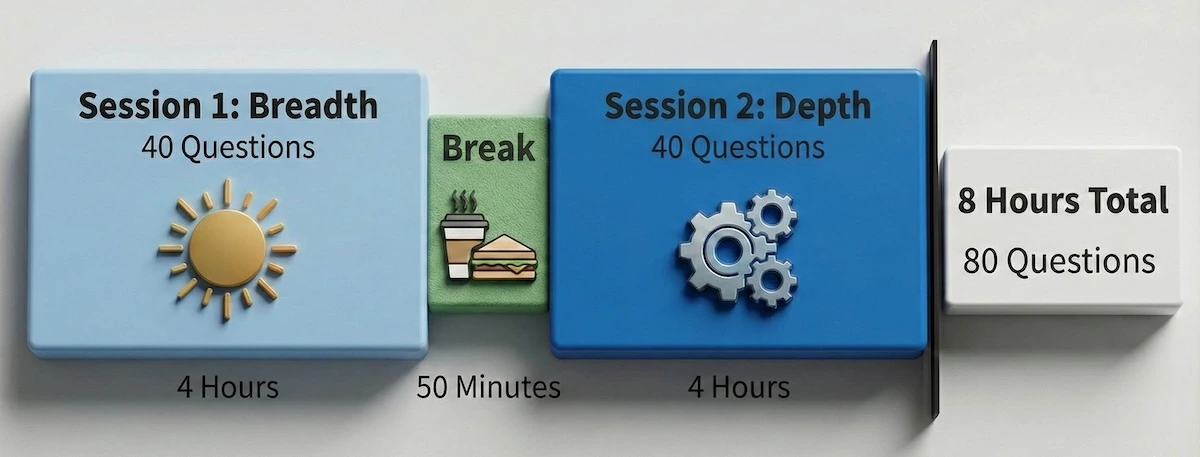
A typical PE Exam day consists of two 4-hour sessions separated by a 50-minute break.
Using the 50-minute break effectively to recharge is crucial for maintaining focus during the complex afternoon ‘depth’ session.
Recent NCEES data reveals significant variation in pass rates across disciplines. First-time test-takers achieve pass rates ranging from 54% in Nuclear Engineering to 81% in Agricultural and Biological Engineering. Popular disciplines show moderate success rates: Civil Engineering disciplines average 61-72%, Mechanical Engineering ranges from 72-78%, and Electrical Engineering varies from 61-67%.
These statistics underscore a critical reality: thorough preparation significantly impacts success probability. Engineers with exactly four years of experience after graduation demonstrate the highest success rates, with pass rates declining proportionally as experience deviates from this optimal timeframe.
The data reveals a critical ‘sweet spot’ for taking the exam where success rates are highest. As shown in the chart below, waiting too long after your four-year mark can actually decrease your chances of passing.
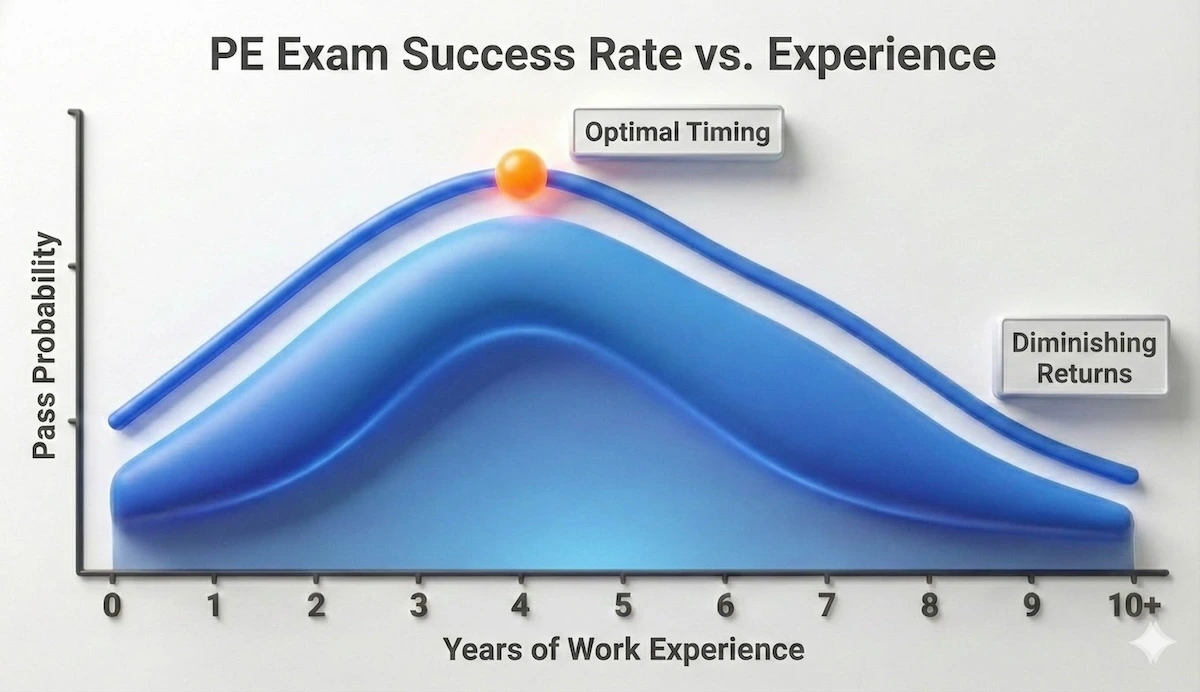
Statistical data suggests the “Sweet Spot” for taking the PE exam is exactly at the four-year experience mark.
This sharp decline suggests that theoretical knowledge from university fades over time, making it harder to pass if you delay.
The Experience Factor
Mark, a civil engineer from California, learned this lesson through direct experience. “I postponed taking the PE exam for six years after becoming eligible,” he explains. “When I finally sat for it, I realized how much theoretical knowledge I had lost. The material that seemed straightforward during my EIT preparation had become challenging again.”
Research consistently shows that examinees with four years of engineering experience after graduation have the greatest probability of success on the PE exam. This finding emphasizes the importance of timely exam scheduling and continuous learning throughout one’s early career.
Why Professional Tutoring Makes the Difference
While self-study is a common approach, it often lacks the feedback loop necessary for mastering complex engineering problems. The table below compares the structural differences between going it alone and working with a professional.
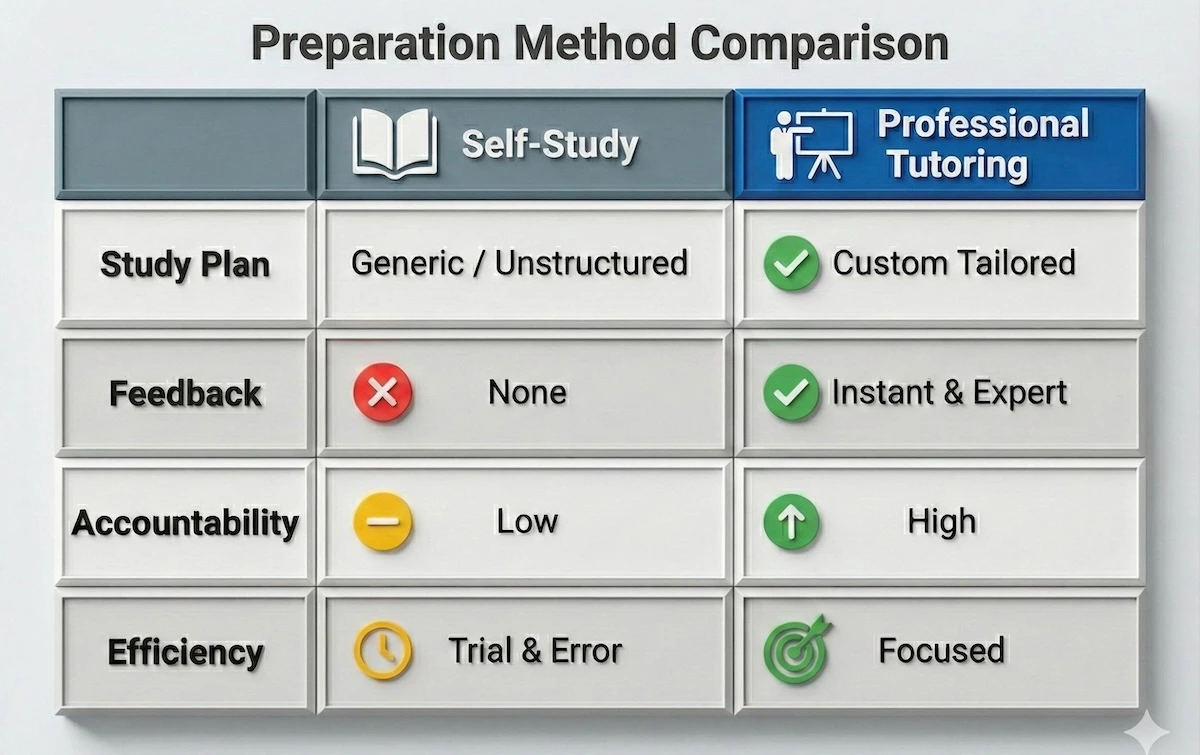
Professional tutoring offers structured accountability and expert feedback that self-study often lacks.
As you can see, the accountability and custom feedback provided by a tutor directly address the pitfalls of the trial-and-error self-study method.
The complexity of PE exam preparation cannot be understated. Unlike undergraduate coursework, the PE exam requires synthesis of advanced engineering principles with practical application skills developed through professional experience. This unique challenge makes Principles and Practice of Engineering tutoring an invaluable resource for serious candidates.
Professional tutoring addresses several critical needs that self-study cannot adequately fulfill. Expert tutors provide personalized attention that identifies and corrects knowledge gaps before they become examination obstacles. This individualized approach proves particularly valuable given the PE exam’s broad scope and discipline-specific focus.
The Tutoring Advantage
Research demonstrates that tutoring improves test performance, increases knowledge retention, and promotes personal growth. For PE exam preparation, these benefits translate directly into enhanced pass probability and reduced test anxiety.
Professional Principles and Practice of Engineering tutoring online has revolutionized access to expert instruction. Students can now connect with specialized tutors regardless of geographic location, accessing expertise that may not be available locally. This flexibility proves essential for working engineers who must balance exam preparation with professional responsibilities.
Lisa, an environmental engineer from Ohio, credits online tutoring with her first-attempt success. “My tutor had taken the exact same exam five years earlier and understood both the technical content and exam strategy,” she notes. “This insider knowledge proved invaluable in focusing my study efforts on high-yield topics.”
Comprehensive Study Strategies for PE Success
Effective preparation isn’t just about reading textbooks; it requires a dynamic workflow. We recommend following this four-step study cycle for every topic you cover.
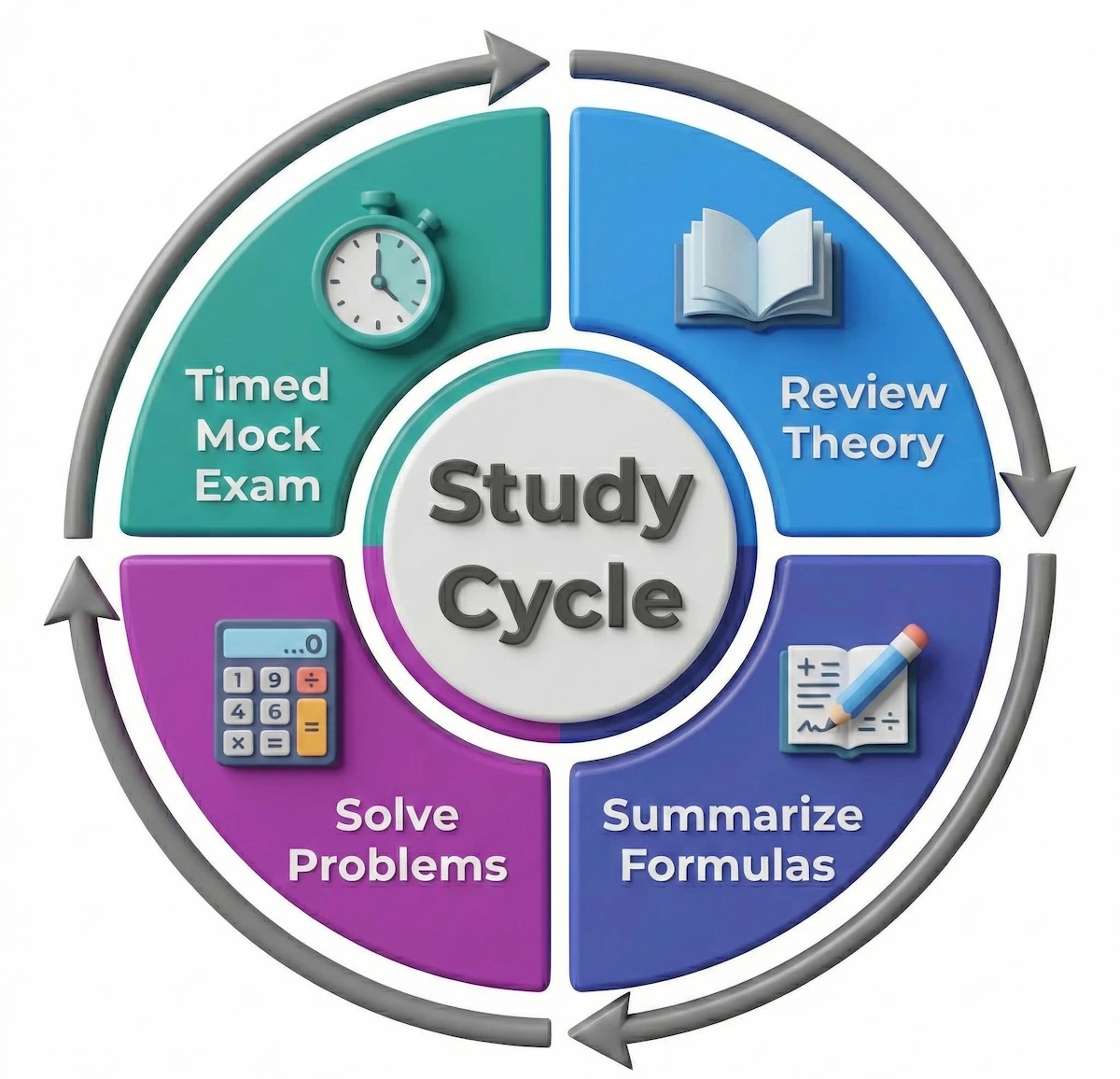
A consistent four-step cycle ensures you cover theory, application, and time management effectively.
By consistently moving from theory to timed practice, you simulate the exam environment during every study session.
Effective PE exam preparation requires a multifaceted approach that combines theoretical review, practical application, and strategic test-taking skills. Principles and Practice of Engineering teaching methodologies have evolved to address these diverse requirements through structured learning programs.
Successful candidates typically employ a combination of study methods. Practice problems form the foundation of effective preparation, with emphasis on working through previous year question papers to identify recurring themes and question types. This approach helps candidates understand both the breadth of material and the specific ways concepts are tested.
Active Learning Techniques
Active learning strategies prove particularly effective for engineering concepts. The most successful study approaches involve teaching concepts to others, working collaboratively through problems, and applying theoretical knowledge to practical scenarios. These techniques mirror the professional engineering environment and reinforce learning through multiple pathways.
Professional Principles and Practice of Engineering homework help services extend beyond simple problem-solving assistance. Quality tutoring programs provide comprehensive assignment support that reinforces lecture concepts while developing critical thinking skills essential for exam success.
The Digital Revolution in Engineering Education
Online learning platforms have transformed Principles and Practice of Engineering tutoring online into a sophisticated educational ecosystem. Modern digital tutoring combines video lectures, interactive problem-solving sessions, and real-time feedback to create immersive learning experiences.
The flexibility of online platforms addresses key challenges faced by working engineers. Students can schedule sessions around work commitments, replay difficult concepts, and access materials from any location. This accessibility has democratized access to high-quality PE exam preparation resources.
Technology-Enhanced Learning
Advanced online platforms integrate multiple learning modalities to accommodate different learning styles. Visual learners benefit from comprehensive diagrams and animations, while kinesthetic learners engage through interactive simulations and virtual laboratory experiences.
David, a mechanical engineer from Florida, describes his online learning experience: “The platform allowed me to work through thermodynamics problems at 2 AM when my kids were sleeping. This flexibility was impossible with traditional in-person tutoring, and it made the difference in my preparation.”
Specialized Support Services
Beyond traditional tutoring, comprehensive Principles and Practice of Engineering assignment help services address the full spectrum of preparation needs. These services typically include custom problem sets, detailed solution explanations, and progress tracking to ensure steady advancement toward exam readiness.
Professional Principles and Practice of Engineering teacher qualifications vary significantly, making careful selection crucial for success. The most effective instructors combine advanced technical degrees with practical PE exam experience and proven teaching track records.
Quality tutoring services employ rigorous instructor screening processes. Leading platforms require tutors to demonstrate both technical expertise and pedagogical skills through comprehensive evaluation processes. This screening ensures students receive instruction from qualified professionals capable of navigating complex engineering concepts.
Customized Learning Plans
Professional tutoring services develop individualized study plans based on diagnostic assessments and learning objectives. These plans typically span 3-6 months and include milestone evaluations to track progress and adjust strategies as needed.
Effective Principles and Practice of Engineering hw help goes beyond simple answer provision. Quality services focus on developing problem-solving methodologies and analytical thinking skills that transfer to novel examination scenarios.
Investment in Future Success
The financial investment in professional PE exam preparation services represents a strategic career decision with substantial long-term returns. While tutoring costs range from $20-40 per hour depending on complexity and instructor qualifications, the career benefits of PE licensure far exceed these preparation expenses.
Consider the mathematics: the salary premium for PE-licensed engineers averages $5,000-42,000 annually depending on discipline and experience level. Even modest tutoring investments of $1,000-3,000 for comprehensive exam preparation programs pay for themselves within the first year of licensed practice.
When you view the preparation costs as an investment rather than an expense, the financial logic becomes clear. The chart below illustrates how quickly the salary increase pays for professional tutoring.
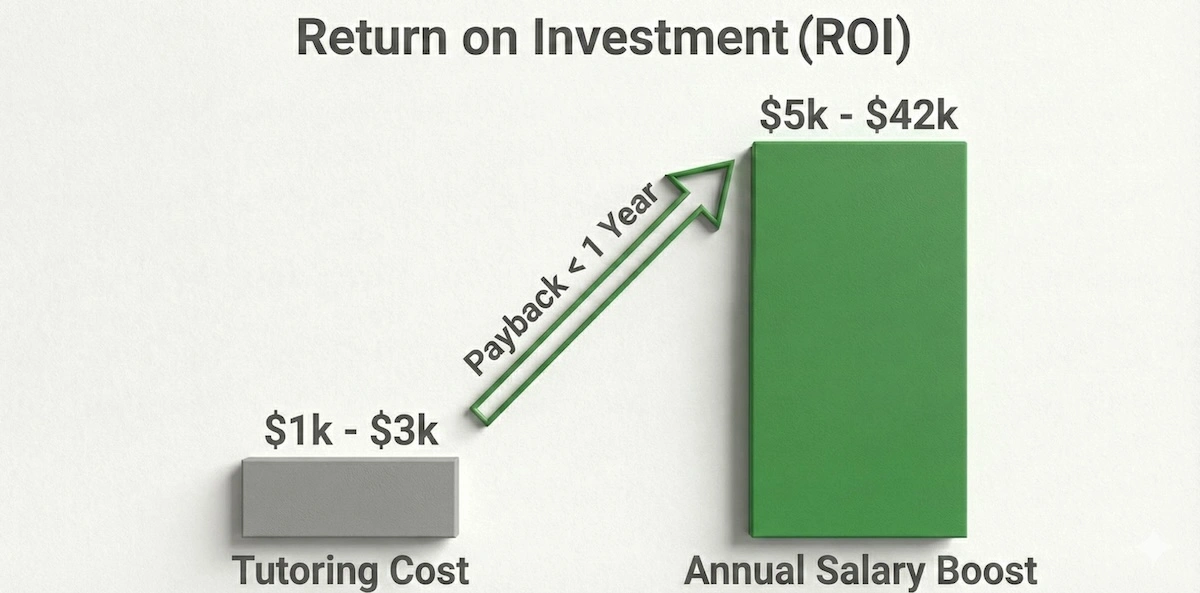
The salary increase from licensure often pays for the cost of tutoring within the first few months of practice.
With a payback period of often less than six months, securing your license is one of the highest-yield financial decisions you can make in your engineering career.
Risk Mitigation
Professional tutoring also provides insurance against exam failure costs. Repeat examinations require additional registration fees, extended study periods, and delayed career advancement. The psychological impact of exam failure can be substantial, particularly given the high stakes nature of professional licensure.
Maria, a chemical engineer from New York, reflects on her preparation investment: “I initially tried self-study to save money but failed my first attempt. The tutoring cost for my second try was less than the opportunity cost of delaying my promotion by another year.”
Building Professional Networks
Quality Principles and Practice of Engineering tutor online services often provide additional networking opportunities through study groups, professional mentorship, and industry connections. These relationships extend beyond exam preparation to provide ongoing career support and professional development opportunities.
The engineering community highly values peer learning and knowledge sharing. Many successful candidates maintain relationships with tutors and fellow students long after passing the PE exam, creating professional networks that enhance career advancement opportunities.
Future-Proofing Engineering Careers
The engineering profession continues evolving with technological advancement and changing industry requirements. PE licensure provides a stable foundation for career growth regardless of technological shifts or economic fluctuations.
Licensed engineers enjoy enhanced job security during economic downturns and industry transitions. The legal authority and professional credibility associated with PE licensure create value that transcends specific technical skills or industry knowledge.
Professional Principles and Practice of Engineering tutor services increasingly emphasize not just exam preparation but career-long learning skills. The most effective programs teach candidates how to continue learning and adapting throughout their professional careers.
Conclusion
The Principles and Practice of Engineering exam represents more than an academic hurdle; it’s the gateway to professional engineering leadership and career advancement. Success requires comprehensive preparation that addresses both technical knowledge and strategic test-taking skills.
Professional tutoring services provide the personalized attention, expert guidance, and structured learning necessary to maximize success probability. Whether through traditional in-person instruction or modern online platforms, quality tutoring transforms the challenging PE exam preparation process into a manageable and successful endeavor.
For engineering professionals serious about career advancement, investing in professional PE exam preparation represents one of the most strategic career decisions possible. The combination of enhanced earning potential, expanded career opportunities, and professional credibility makes PE licensure an invaluable credential in today’s competitive engineering landscape.
The path to professional engineering licensure demands dedication, strategic preparation, and expert guidance. With the right support system and comprehensive preparation approach, the PE exam transforms from an intimidating obstacle into an achievable milestone in a successful engineering career.
Frequently Asked Questions
Q1 How long should I prepare for the PE exam?
Most successful candidates prepare for 3-6 months with structured study plans and professional guidance.
Q2 What is the average cost of PE exam tutoring?
Professional PE exam tutoring typically ranges from $20-40 per hour depending on instructor qualifications and complexity.
Q3 Can I take the PE exam immediately after graduation?
No, most states require four years of professional engineering experience before PE exam eligibility.
Q4 What happens if I fail the PE exam?
Candidates can retake the exam after a waiting period, though additional preparation and fees are required.
Q5 Is online PE exam tutoring as effective as in-person instruction?
Research shows online tutoring can be equally effective when properly structured with qualified instructors.
Q6 How much salary increase can I expect with PE licensure?
PE-licensed engineers typically earn $5,000-42,000 more annually depending on discipline and experience level.
Related Subjects
PE Agricultural and Biological Engineering
PE Architectural Engineering
PE Chemical Engineering
PE Civil: Construction
PE Civil: Geotechnical
PE Civil: Structural
PE Civil: Transportation
PE Civil: Water Resources and Environmental
PE Control Systems Engineering
PE Electrical and Computer: Computer Engineering
PE Electrical and Computer: Electrical and Electronics
PE Electrical and Computer: Power
PE Environmental Engineering
PE Fire Protection Engineering
PE Industrial and Systems Engineering
PE Mechanical: HVAC and Refrigeration
PE Mechanical: Machine Design and Materials
PE Mechanical: Thermal and Fluids Systems
PE Metallurgical and Materials Engineering
PE Mining and Mineral Processing Engineering
PE Naval Architecture and Marine Engineering
PE Nuclear Engineering
PE Petroleum Engineering
PE Software Engineering (discontinued)
PE Structural Engineering
******************************
This article provides general educational guidance only. It is NOT official exam policy, professional academic advice, or guaranteed results. Always verify information with your school, official exam boards (College Board, Cambridge, IB), or qualified professionals before making decisions. Read Full Policies & Disclaimer , Contact Us To Report An Error
